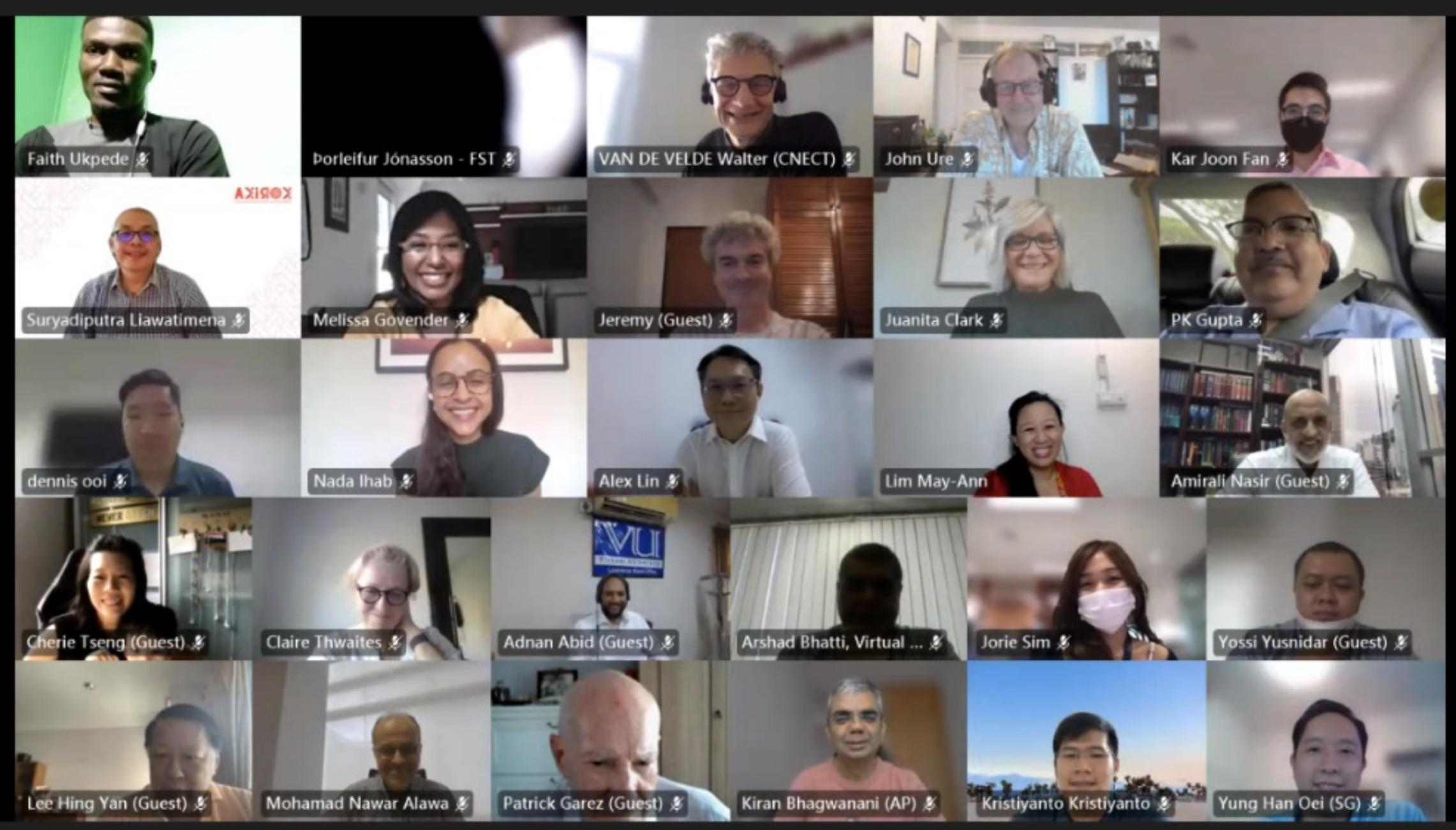

Lim May-Ann
Access Institute


Nada Ihab
Artificial Intelligence




Watch The Metaverse Dialogue – An Exploratory Primer here.
More than 120 discussants participated in the inaugural Metaverse Dialogue on 2 Jun 2022. Hosted by Access Partnership’s Metaverse Policy Lab and the Fair Tech Institute, this was an interactive online discussion where participants were invited to share their thoughts on various aspects of the metaverse, in whatever approach they chose to interpret this new concept. The aim of the dialogue – and the Metaverse Policy Lab – is to engage thought leaders in attendance in thinking through the different lenses by which we could view the metaverse, so that together, we can co-create solutions to issues which then arise.
To kick off the dialogue, Director of the Fair Tech Institute Lim May-Ann introduced the Metaversality Index 2022 (MVI2022), which measures the strength of a metaverse ecosystem. It is designed as a framework that provides a scalable, score-able map of how we are beginning to make sense of the various components of the metaverse, and all the various products which work to form the metaverse.
The MVI2022, which was developed by primary authors Lim May-Ann and Nada Ihab, proposed seven attributes which comprised the metaverse: (1) Entering and Presence(2) Identity, Representation, and Avatars, (3) Home, Travel, and Discovery, (4) Interoperability and Standards, (5) Data Protection, Privacy, and Safety, (6) Virtual Media/Artefacts, Markets, and Transactions, and (7) Interactivity and Interfaces. Participants were then given an opportunity to interact with the scoring mechanism of the MVI 2022, allowing them to have some first-hand experience on how to begin to use the index.
Participants and thought leaders then took centre stage and the floor with robust discussion for the rest of the dialogue, hosted first by Melissa Govender who helmed questions around data protection and privacy, and Nada Ihab, who focused on what skills were needed for training and education in the context of a future living in/with the metaverse. The dialogue revealed that participants were thinking about, and asking these questions around the development of the metaverse, and next steps for public policy discussions:
Metaverse conceptual issues dominated the early discussion – participants were questioning what was the metaverse, and what does it entail? This segued quickly and seamlessly into a discussion around data protection, privacy, and security issues, where participants raised the question: will there be a metaverse which will allow me complete anonymity? What are the levels of traceability and trackability in the current metaverse? Is it possible that there be the complete lack of traceability, breadcrumbs, and fingerprints built into the metaverse?
While most participants appeared to concur that there this might not be possible, one participant pointed out that there would always be another platform which would be less regulated, and/or have less rules, and so people could choose to have a riskier experience on the metaverse, if they were willing to trade that with going into/using a metaverse with more lax rules.
Another participant pointed out that there appears to be the general assumption that there is only ONE “public metaverse”, when he believed that there could be many private metaverses which would be developed, and evolve differently from each other. He was of the opinion that these private metaverses would each have their own rules of engagement, much like how there are different games and zones within games today. The question, he stressed, was the broader data governance question: how can we develop holistic regulations to be applied for both “public and private metaverses”?


For those looking into AI and interactivity, there was a question around representation and trust systems – while the MVI does ask if metaverses are able to accurately represent the self in a customizable avatar form, one participant asked if there could or would be proof or verifiability of who we are speaking to – will we know if we are speaking and interacting with a ‘bot? Is there some indicator/verifiability for being human, some sort of Turing Test to ensure we are speaking with who we think we are?
Another participant pointed out that it does take a few stakeholders to bring this to reality – the platform operators, coupled with the desire of the user to represent the “real” self and also to accurately represent his “real emotion”, transposed through the tools provided by the platform operators. A larger question is also whether or not a government could, or would want to, implement a regulation which would demand this transparency, to monitor and/or manage this option.
There are challenges to managing the metaverse now that are being played out between the more digitally-literate, and the more vulnerable communities such as those who are less well-versed with new technologies, as well as young children, or those who might be more susceptible to finance fraud on the metaverse. A participant noted that the metaverse development we see now runs the risk of having early adopters become something like a “metaverse mafia” who take advantage of the more vulnerable within the system, as they may not know better. And the challenge we face today as responsible netizens (metaversians?) is the question: how do we balance against the desire to innovate with new technology, and yet be protecting those who may be taken advantage of in this space?
Another participant chimed in and pointed out that related to this was another very interesting facet where we are moving from Web 2.0 text-based technologies, to a Web 3.0 world which is primarily video and voice/audio-driven. They posed the question to the entire group – what would be the new shape of content moderation in a metaverse world that is primarily voice-driven? And what would this look like without being unnecessarily intrusive or surveilling a metaverse’s participants?
One response to this challenge was that while rules and regulations may indeed be put in place, there will always be the challenge of enforceability – how would policies be implemented, and could they be implemented without unnecessarily causing usability friction, or possibly infringing on other rights? Another participant contributed links in the chat, suggesting that the BBC had a series called The Digital Human, where the host explores how social media impacts social behaviour, and the implications for changing social norms in the metaverse.
The conversation then shifted to the future of the metaverse, and questions around the next step for learning. One dialogue contributor pointed out that there is a new generation who have started to adopt new technologies and new platforms through games and gaming, and this next generation learns via a different approach – learning through play. The rules for engagement and education therefore have changed – if a mental “venue” for learning was not fun, then learning would not happen.
This has implications for jobs and skills, training, and new policies as well – the value proposition for AR/VR and new training techniques and aligning jobs and skills training with gamification, the new metaverse concepts, and meshed together with new learning pedagogies such as micro-certifications, MOOCs, and on-the-job training, has created a new green field for understanding how learning happens in the metaverse. There are further implications for reverse inter-generational learnings, and methodologies for immersive learning as well – and we have only begun to start understanding what changes need to be brought to the fore in updating educational curricula in preparation for a world with the metaverse.
As the session demonstrated, thought leaders have only started to scratch the surface of what the metaverse is, how it is evolving, and mapping out the issues which need to be addressed as we build the metaverse together. The Metaverse Dialogue will continue to map out the evolution of our metaverse thinking together in future discussions, and all participants and thought leaders are invited to continue to participate and be a part of this metaverse journey together.
Watch The Metaverse Dialogue – An Exploratory Primer here.
Thought Leader List 2 June 2022
Thought leaders who attended this inaugural session of The Metaverse Dialogue, and contributed to this discussion include:



